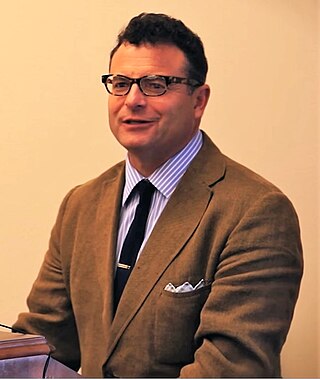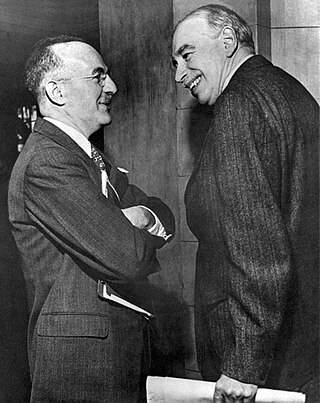The Austrian School is a heterodox school of economic thought that advocates strict adherence to methodological individualism, the concept that social phenomena result primarily from the motivations and actions of individuals and their self interest. Austrian school theorists hold that economic theory should be exclusively derived from basic principles of human action.

Friedrich August von Hayek, often referred to by his initials F. A. Hayek, was an Austrian-British economist and political philosopher who made contributions to economics, political philosophy, psychology, intellectual history, and other fields. Hayek shared the 1974 Nobel Memorial Prize in Economic Sciences with Gunnar Myrdal for work on money and economic fluctuations, and the interdependence of economic, social and institutional phenomena. His account of how prices communicate information is widely regarded as an important contribution to economics that led to him receiving the prize.

Milton Friedman was an American economist and statistician who received the 1976 Nobel Memorial Prize in Economic Sciences for his research on consumption analysis, monetary history and theory and the complexity of stabilization policy. With George Stigler, Friedman was among the intellectual leaders of the Chicago school of economics, a neoclassical school of economic thought associated with the work of the faculty at the University of Chicago that rejected Keynesianism in favor of monetarism until the mid-1970s, when it turned to new classical macroeconomics heavily based on the concept of rational expectations. Several students, young professors and academics who were recruited or mentored by Friedman at Chicago went on to become leading economists, including Gary Becker, Robert Fogel, and Robert Lucas Jr.

In macroeconomics, money supply refers to the total volume of money held by the public at a particular point in time. There are several ways to define "money", but standard measures usually include currency in circulation and demand deposits. Money supply data is recorded and published, usually by the national statistical agency or the central bank of the country. Empirical money supply measures are usually named M1, M2, M3, etc., according to how wide a definition of money they embrace. The precise definitions vary from country to country, in part depending on national financial institutional traditions.

The causes of the Great Depression in the early 20th century in the United States have been extensively discussed by economists and remain a matter of active debate. They are part of the larger debate about economic crises and recessions. The specific economic events that took place during the Great Depression are well established.
The quantity theory of money is a theory from monetary economics which states that the general price level of goods and services is directly proportional to the amount of money in circulation, and that the causality runs from money to prices. This implies that the theory potentially explains inflation. It originated in the 16th century and has been proclaimed the oldest surviving theory in economics.
Neutrality of money is the idea that a change in the stock of money affects only nominal variables in the economy such as prices, wages, and exchange rates, with no effect on real variables, like employment, real GDP, and real consumption. Neutrality of money is an important idea in classical economics and is related to the classical dichotomy. It implies that the central bank does not affect the real economy by creating money. Instead, any increase in the supply of money would be offset by a proportional rise in prices and wages. This assumption underlies some mainstream macroeconomic models. Others like monetarism view money as being neutral only in the long run.

Free banking is a monetary arrangement where banks are free to issue their own paper currency (banknotes) while also being subject to no special regulations beyond those applicable to most enterprises.
The Austrian business cycle theory (ABCT) is an economic theory developed by the Austrian School of economics about how business cycles occur. The theory views business cycles as the consequence of excessive growth in bank credit due to artificially low interest rates set by a central bank or fractional reserve banks. The Austrian business cycle theory originated in the work of Austrian School economists Ludwig von Mises and Friedrich Hayek. Hayek won the Nobel Prize in Economics in 1974 in part for his work on this theory.

Lawrence Henry White is an American economics professor at George Mason University who teaches graduate level monetary theory and policy. He is considered an authority on the history and theory of free banking. His writings support the abolition of the Federal Reserve System and the promotion of private and competitive banking.

George Selgin is an American economist. He is Senior Fellow and Director Emeritus of the Cato Institute's Center for Monetary and Financial Alternatives, where he is editor-in-chief of the center's blog, Alt-M, Professor Emeritus of economics at the Terry College of Business at the University of Georgia, and an associate editor of Econ Journal Watch. Selgin formerly taught at George Mason University, the University of Hong Kong, and West Virginia University.

Henry Calvert Simons was an American economist at the University of Chicago. A protégé of Frank Knight, his antitrust and monetarist models influenced the Chicago school of economics. He was a founding author of the Chicago plan for monetary reform that found broad support in the years following the 1930s Depression, which would have abolished the fractional-reserve banking system, which Simons viewed to be inherently unstable. This would have prevented unsecured bank credit from circulating as a "money substitute" in the financial system, and it would be replaced with money created by the government or central bank that would not be subject to bank runs.
This is the chronological list of books by the Austrian school economist and philosopher Friedrich Hayek. The dates in brackets are the original year of publication of the book.

Fiat money is a type of currency that is not backed by a precious metal, such as gold or silver. It is typically designated by the issuing government to be legal tender, and is authorized by government regulation. Since the end of the Bretton Woods system in 1971, the major currencies in the world are fiat money.

The post-war displacement of Keynesianism was a series of events which from mostly unobserved beginnings in the late 1940s, had by the early 1980s led to the replacement of Keynesian economics as the leading theoretical influence on economic life in the developed world. Similarly, the allied discipline known as development economics was largely displaced as the guiding influence on economic policies adopted by developing nations.
Richard Henry Timberlake Jr. was an American economist who was Professor of Economics at the University of Georgia for much of his career. He became a leading advocate of free banking, the belief that money should be issued by private companies, not by a government monopoly. He wrote about the Legal Tender Cases of the U.S. Supreme Court in his book Constitutional Money: A Review of the Supreme Court's Monetary Decisions.
Institutum Europeaum was a libertarian think tank based in Sint-Genesius-Rode, a suburb of Brussels, Belgium. The Institutum was founded and led by Michiel (Michael) Van Notten, a Dutch lawyer and intellectual, in the late 1970s until his death in 2002. Institutum Europaeum was in the vanguard of the efforts to prevent the centralization and growth of power in the European Community/European Union, and was particularly active in arguing against European Monetary Union.

Money and Trade Considered: With a Proposal for Supplying the Nation with Money is an early economics text written by John Law of Lauriston, published in 1705. In it, he attempts to compare the prosperity of other countries with that of Scotland, and advocates a "land bank" system of paper money backed by real estate as a commodity instead of gold or silver.
The real bills doctrine says that as long as bankers lend to businessmen only against the security (collateral) of short-term 30-, 60-, or 90-day commercial paper representing claims to real goods in the process of production, the loans will be just sufficient to finance the production of goods. The doctrine seeks to have real output determine its own means of purchase without affecting prices. Under the real bills doctrine, there is only one policy role for the central bank: lending commercial banks the necessary reserves against real customer bills, which the banks offer as collateral. The term "real bills doctrine" was coined by Lloyd Mints in his 1945 book, A History of Banking Theory. The doctrine was previously known as "the commercial loan theory of banking".
Cryptocurrency in Nigeria describes the extent of cryptocurrency use, social acceptance and regulation in Nigeria.











